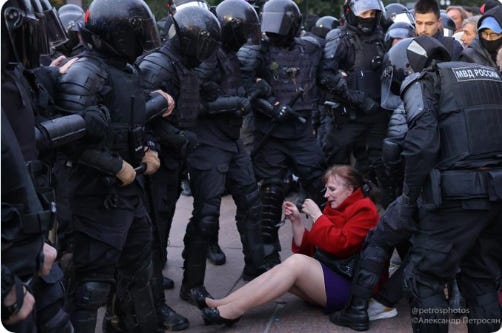If you’ve never seen the movie Downfall, about the final days of Adolf Hitler’s rule in Nazi Germany, it’s worth it not only for the unforgettable performance by the late German actor Bruno Ganz but also for the depiction of a dictator faced with the collapse of the alternative reality he has constructed for himself and nurtured over the years. Of course, as the viewer sees in the climactic bunker scene, even in extremis Hitler blames other people for his own grievous errors.
I was reminded of the movie when I read a New York Times report that Vladimir Putin has now inserted himself into the direction of Russian combat operations in occupied Ukraine; specifically he has demanded that Russian troops continue to hold the city of Kherson even though Ukrainian forces have largely cut off their supply lines. Hitler famously ignored his generals’ pleas to allow the Sixth Army to retreat from Stalingrad. He was adamant that the Wehrmacht not abandon the city named for his Soviet opponent. So the Sixth Army was eventually surrounded and destroyed; most of the survivors perished in Soviet prison camps.
A common thread among authoritarian leaders- Hitler, Putin, Mussolini, Saddam Hussein, Hugo Chavez- is that they’re willing to destroy their own countries rather than admit they’ve failed. No measure to save the dictator is considered too extreme. Hitler had his Volkssturm - a last-ditch army of the old and unfit - and Putin has his “partial mobilization.”
Russia’s mobilization is providing observers a window onto a society which is sick and broken by 22 years of Putinism. The dysfunction and degradation which are being revealed is so pervasive that it’s difficult for even a former Russia hand like myself to cogently summarize. Alcoholism has long been a scourge of Russian society and it’s probably the primary reason that the average male lives only 66 years. But it’s still shocking to see how many Russian men are showing up for enlistment while falling-down drunk. They’re passing out in the grass next to the tarmac, or weaving back and forth as they try to make their way to the bus that will take them to training. Or bringing bottles on the bus for the ride to the barracks. Or brawling amongst each other, or with the police who are forcing them onto the buses, as happened in Omsk over the weekend. Once they actually make it to an army base, they are being issued rusty, outdated weapons (useful only as clubs) and sleeping on stained mattresses in decrepit buildings. They won’t be there long, however: the Ukrainian General Staff reported that some of these new Russian “troops” have already arrived at the front lines after zero training. Of course a lot of men aren’t showing up at all. The FSB- Russia’s internal security service- admits that some 260,000 men have left Russia in the span of a week. It would not be surprising to see the government revive the Soviet-era total closure of its borders in order to stem the manpower drain.
The mobilization’s effects on non-Russian and rural communities are devastating, particularly since it seems to be widely understood by local residents that most of their men will not return. Videos from towns in Dagestan and Yakutsk have revealed demonstrations against the mobilization; virtually everyone in the crowds is female. The men are either in hiding or have already been taken away. In one village in the Kemerevo region of Siberia, the village’s entire male population (59 men) was conscripted. There is reporting that Crimean Tatars in occupied Ukraine- long discriminated against in Russian society- are being press-ganged into the army. The reasons for the mobilization’s disproportionate focus on non-Russian minorities are twofold. First, Putin considers ethnic minorities to be less of a political threat to his rule. Secondly, Putin- as Hitler did- believes in a hierarchy of races; he will not be displeased if Russia’s population becomes whiter.
As long as popular resistance to the mobilization took the form of simple demonstrations, as it did initially, the regime had little trouble suppressing it. Unarmed demonstrators are no match for police wearing body armor and wielding truncheons.
But the character of the resistance is changing. More recruiting centers have been firebombed in the last week than in the previous six months of the war. In the town of Ust-Ilimsk a man entered the office of the local military commandant and shot him to death. In Ryazan a man shouting that he wanted no part of “Putin’s war” set himself on fire in front of a bus station. By announcing this mobilization Putin has broken an implicit contract with the Russian people stipulating that as long as they avoided political activity, the state would leave them alone. Russia’s wars would be fought by contract soldiers who knew what they had signed up for. The breaking of this contract has unleashed years of pent-up rage and frustration. It’s important to remember that the popular resistance we’re seeing is motivated primarily not by opposition to Russia’s war in Ukraine but to citizens suddenly being forced to play a role in it.
After announcing his mobilization, Putin headed for a literally undisclosed location (presumably one of his secret palaces) for a week’s vacation, leaving his subordinates to somehow implement his folly. They will take the blame for its disastrous shortcomings as well; any criticisms of the regime’s policies must be laid somewhere short of the Leader himself. Are the other “men of power” perhaps thinking of ridding themselves of the architect of this debacle ? It seems unlikely, if for no other reason than there is no process by which to replace Vladimir Putin: there is no Politburo or Central Committee which could reach consensus on a new leader. At this juncture it seems more likely that Putin’s eventual downfall comes about as a result of the social explosion he is risking in order to avoid having to admit he has lost in Ukraine.



